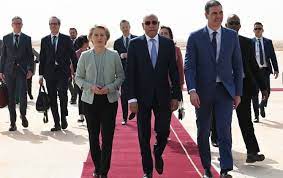Dr. Majid Rafizadeh
As the EU this week marked the 32nd anniversary of its creation, it is a fitting moment to reflect on the journey of this historic alliance. The EU has undergone profound transformations, while facing numerous challenges and achieving notable successes.
In the Dutch city of Maastricht, a significant moment transpired on Feb. 7, 1992, as the Treaty on European Union was officially signed. This milestone not only established explicit regulations for the impending single currency, but also outlined frameworks for collective foreign and security policies, as well as fostering closer collaboration in justice and home affairs. The formal inception of the “European Union” was thereby marked by the enactment of this pivotal treaty.
The journey of the EU has not been without its hurdles. The union has confronted economic crises, political divisions, the unprecedented global challenges posed by the COVID-19 pandemic and, more recently, the Russia-Ukraine war. In addition, the economic disparities among member states, as exemplified by the struggles of Southern European countries during the eurozone crisis, underscore the ongoing challenge of achieving economic convergence. Furthermore, it is worth noting that the EU has grappled with political divisions, most notably during the Brexit saga. The decision of the UK to leave the union in 2016 highlighted internal fissures and raised questions about the cohesion of the bloc. The aftermath of Brexit has necessitated a reevaluation of the EU’s structures and policies, particularly in areas such as trade, security and immigration.
In spite of these challenges, the EU has achieved significant milestones that have shaped its identity as a global player. For example, the creation of the euro currency in 1999 stands out as a symbol of economic integration and the fostering of trade and stability among nations.
The enlargement of the EU to include many more Central and Eastern European countries in the early 2000s brought about political and economic transformation, enhancing stability and cooperation in the region. Moreover, the EU has played a pivotal role in promoting peace and diplomacy. The union was awarded the Nobel Peace Prize in 2012 for its contribution to the advancement of peace, reconciliation, democracy and human rights in Europe. The Schengen Area, which was established in 1995 and allows for passport-free travel among member states, exemplifies the bloc’s commitment to fostering unity and cooperation. When it comes to the economic perspective, it was believed that one of the primary advantages of EU membership would lie in the economic benefits derived from the single market. Member states have access to a vast consumer base, facilitating trade and economic growth. Indeed, the free movement of goods, services, capital and people has not only boosted economic activity but has also promoted cultural exchange and understanding among European citizens.
Another issue is related to environmental sustainability and social justice, which has led the EU to implement progressive policies. From stringent environmental regulations to the protection of workers’ rights, the EU has sought to create a harmonious and equitable society. Additionally, there has been an emphasis on research and innovation, which has propelled Europe to the forefront of technological advancements, fostering its competitiveness on the global stage.
While the EU has undoubtedly brought about positive changes, it is not immune to criticism. For example, the eurozone crisis of the early 2010s exposed the flaws in the common currency framework and revealed the challenges of maintaining economic harmony among diverse economies. Austerity measures imposed on struggling member states led to social unrest and raised questions about the effectiveness of the EU’s economic policies.
Moreover, the handling of migration issues has been a divisive topic. Disagreements among member states on burden-sharing and the lack of a unified approach have strained relations, revealing underlying tensions and disparities in the EU’s response to humanitarian challenges. In addition, the democratic deficit, characterized by a perceived lack of accountability and transparency in decision-making processes, has been a recurrent concern. Some critics argue that unelected officials in Brussels exert too much influence, potentially undermining the democratic principles member states hold dear.
To strengthen the union, its leaders face the critical task of reinforcing it to navigate an ever-evolving geopolitical landscape. This includes implementing effective mechanisms to address economic disparities among member states. This can be achieved by focusing on promoting sustainable economic growth among all members, investing in education and innovation and fostering job creation to achieve greater convergence. And, in order to counter criticisms of a democratic deficit, EU institutions should prioritize transparency and inclusivity. Engaging with citizens through open dialogue and ensuring that decision-making processes are more accessible can help rebuild trust and strengthen the democratic foundation of the union.
More fundamentally, the EU ought to develop a unified and compassionate approach to migration, addressing both the humanitarian aspects and the concerns of member states. A comprehensive migration policy, based on solidarity and burden-sharing, can contribute to a more cohesive and cooperative union.
Finally, as the world faces challenges such as climate change, cybersecurity threats and global health crises, the EU must constantly adapt its policies to address these issues collectively. Strengthening cooperation in areas of common interest will reinforce the EU’s role as a leader in addressing global challenges. This can include embracing technological advancements and fostering innovation. Investing in research and development, promoting digitalization and ensuring that member states are equipped to navigate the digital age will also contribute to the union’s competitiveness on the global stage.
In a nutshell, the EU’s ability to adapt and overcome challenges and conflicts will determine its role in shaping the future of Europe and beyond. By addressing economic disparities, building a common approach to migration, adapting to global challenges and fostering innovation, EU leaders can chart a course for a stronger and more resilient union.







